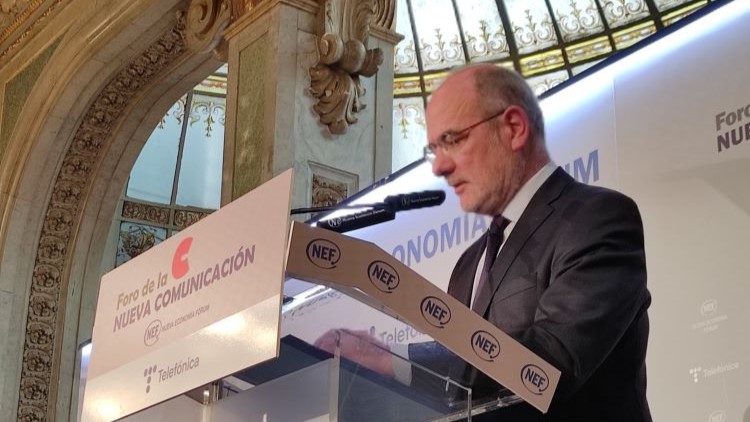The Diplomat
The director general of Communication and spokesman of the European Parliament, Jaume Duch, said yesterday in Madrid that Ferrovial’s decision to move its headquarters from Spain to the Netherlands reveals the lack of fiscal harmony in the EU, which general “mismatches” and situations “little difficult to understand.”
“It is an issue on which the European Commission has the right to put forward proposals and has done so, the European Parliament can study them and can give its opinion, but in the end that is a decision that is the sole and exclusive responsibility of the Member States,” Duch declared at the New Communication Forum in relation to whether Brussels should defend the right of companies to move when they see fit and within the Union’s own limits.
“The taxation of the European Union is, precisely, one of the issues that remain strictly in the hands of the governments of the Member States”, which affects that, “in the end, the European Union advances unevenly”, with progress “in the issues in which it can decide more easily and less progress in the issues in which it can be blocked very easily”, continued the lawyer and journalist from Barcelona during the informative breakfast, organized by New Economy Forum and presented by the permanent representative of Spain to the European Union, Marcos Alonso.
The “crux of the matter”, he continued, is that “we have managed to set up an internal market” and, at the same time, “develop commercial policy, industrial services, etc., to the maximum, and therefore we have given companies a passport that they can use”. On the other hand, he regretted, “we have not sufficiently harmonized a series of policies, including fiscal policy, and this creates imbalances” and “situations that, at times, can be a little difficult to understand”.
United Kingdom and Gibraltar
On the other hand, Jaume Duch acknowledged that, after the recent approval of the so-called ‘Windsor framework’ to replace the so-called ‘Ireland protocol’ in the Brexit negotiations, “the United Kingdom is beginning to realize in what situation it has placed itself alone or was placed by those who governed it at a given time”.
In this context, he continued, “we have seen how, in the last few days, the United Kingdom has again given a series of signs of rapprochement towards the European Union with the issue of the review of the protocol on Ireland”, which gives “the feeling that the degree of pragmatism” in the country is beginning to increase. It is a pragmatism, he admitted, “that has taken a long time to arrive but is beginning to increase, and let us hope that it continues to increase, because there are many things that the United Kingdom and the European Union can do together” because “it is not necessary to be a member of the European Union to cooperate in many of its programs” or “to intensify the relationship in policies such as security or defense, or scientific cooperation policies or youth mobility policies”.
In these circumstances, Duch affirmed that the agreement regarding the future relationship with Gibraltar is an “issue that is on track”. “Things are progressing well, and in Parliament there is, in general, satisfaction regarding this issue”, for “the possibility that Gibraltar will continue to belong to the Schengen area and that the social rights of the more than 15,000 Spanish workers who cross the line every day will be protected”, he continued.
On this issue, “the role of the European Union is to push things in the right direction”, after the first “bilateral negotiation between Spain and the United Kingdom itself and, from that negotiation, the transposition of these proposals to the European Commission, which is who then has to negotiate them on behalf of the Union itself”. “One of the consequences of the agreements of the, let’s call it divorce, between the European Union and the United Kingdom is to give Spain a much more important and much more preponderant role in deciding, exactly, what is going to be the relationship with Gibraltar,” he stated.
Qatargate and Ukraine
On the other hand, Jaume Duch said that the President of the European Parliament, Roberta Metsola, “has done what she had to do and what public opinion expected of her, which is to take the bull by the horns” in the so-called Qatargate scandal, the alleged corruption scheme associated with a network of influence peddling promoted by the Qatari regime, which led to the dismissal of the Greek Socialist Eva Kaili and one of the vice presidents of the Parliament.
He also assured that the EU “is taking very important steps” in the collection and preservation of evidence “of the atrocities that Russia is committing in Ukraine”, in order to be able to bring the President of the Russian Federation, Vladimir Putin, before the International Criminal Court. Among these steps, he highlighted the implementation, by the President of the Commission, Ursula Von der Leyen, “of an organization, of a system that will allow the evidence of the atrocities that Russia is committing in Ukraine not to be lost”.
During the presentation of the event, Marcos Alonso said that the response to the Russian aggression against Ukraine has shown that the EU “can also be a geopolitical actor.” “It has demonstrated the strength of European unity of action, it has become clear that when the European Union acts united it is much more than the sum of individual efforts of each member state,” he added.






